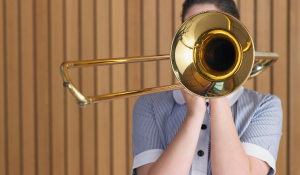

Posts about:


We followed up with Band Director Justin Antos, Director of Bands at Dwight Eisenhower High School, after he switched his full marching band section from their stock mouthpieces to Denis Wick Mouthpieces. Learn about the struggles that lead up to this switch, and what differences they experienced when the whole brass section was playing on new mouthpeices in this interview with Justin.

"Is a trumpet or trombone mute more than it's shape?" Logically the answer is yes. However in the manufacturing world, it is a bit more of a gray area. Low-priced student mutes have become as numerous as flavors of ice cream these days. So how do you define quality? How do you differentiate between mute functioned and mute shaped?

When do I need to find a new mouthpiece?
After a student has learned how to make a sound on their new brass instrument, and make it consistently, their next focus is on improving that sound. Since sound starts with the mouthpiece, your first upgrade should logically be the mouthpiece. But when and how do you find the right one? Use these tips to understand the process and help you student take their fist steps to expanding their sound and skills.

If you are a beginner musician, your job is easy. Just use our Mouthpiece Suggestions to find an appropriate beginner mouthpiece. If you have advanced from beginner, you have a few more steps to choose the mouthpiece that supports you best.

If you have hung around Denis Wick for even a short time, you have probably seen some content on the extreme functional versatility of this mute. The adjustable cup not only allows you ultimate tone color versatility for your cup mute performance, but can be pulled apart and used in multiple different ways. How many you ask? find out in this quick video with Denis Wick artist Estela Aragon.

When getting ready for a significant performance, it's common to divide your preparation into two categories: musical preparation and physical preparation. Incorporate these four principles of preparation from Denis Wick Artist Victor Haskins to ensure that your preparation is effective and promotes your overall well-being for your upcoming big performance.